Campaign History of the 151e Régiment d'Infanterie - X
~ 1916 ~
Specialist Training and Refitting (1 January - 24 February)
1-5 January: The entire regiment goes to billet at Mourmelon-le-Grand, including the colonel's PC. The two MG Cos. remain at Fleurus Quarter. The next day is spent preparing their new billets and in cleaning. On 3 January, the regiment prepares to depart for new billets and advanced instruction. The 1 and 3 Bats. depart at 0700 hrs to go to billet at Les Grandes-Loges (12 km to the southeast). The 2 Bat. departs at 0730 hrs to go to billet at Bouy (6 km to the southeast) with the regimental staff. The two MG Cos. are billeted at Grandes-Loges. Sous-Lieut. Caste-Barou is promoted to lieutenant. On 4 January, the regiment spends the day installing itself in its new billets and in cleaning. Transfers: Sous-Lieut. Duclos transfers from 4 to 3 Co. Capt. Ritter transfers from 3 to 4 Co. to take command.
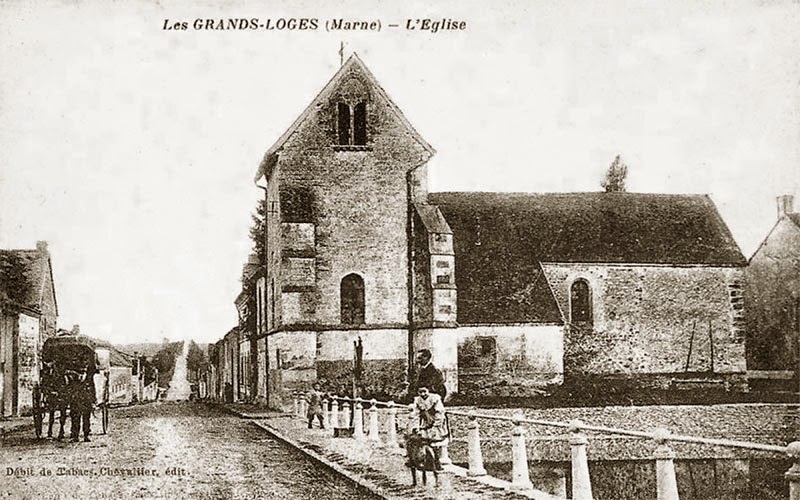
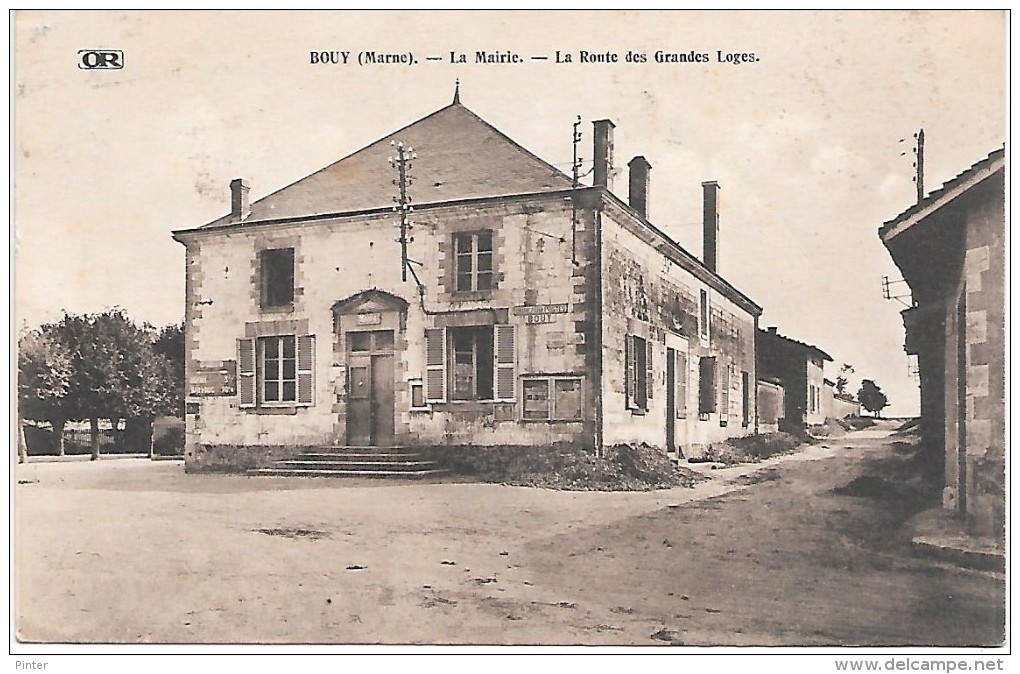
Les Grandes Loges (left) and Bouy town hall (right) before the war.
5-24 January: The regiment will spend three weeks, from 5-23 January, in specialist infantry instruction (grenadiers, rifle machine-gunners, signalers, etc.), becoming the "new army" Moisson had spoken of on New Year's Eve of 1915. At noon on 6 January, 1 and 3 Bats. will go on a 12 km training march with full packs. Lieut. Dumesnil returning after being previously evacuated, is immediately evacuated again. On 7 January, 6 and 7 Cos. (2 Bat.) go to billet at Vadenay. Médecin Aide Major Rivière is evacuated. On 10 January, Lieut.-Colonel Moisson rewards Croix de Guerreat Bouy before 8 Co. assembled under arms. Transfers: Lieut. Olivier commanding 12 Co. transfers to 1 Co. and becomes a chef de section (section leader); Sous-Lieut. Cavallier transfers from 5 to 6 Co.; Sous-Lieut. Albertini transfers from 6 to 5 Co.; Lieut. Ternisien returns from evacuations and retakes command of 12 Co.
At 1000 hrs on 12 January, Lieut.-Colonel Moisson accompanied by the regimental flag and its color guard goes to the Bouy Hospital to award the Medaille Militaire to Caporal Trubert (amputee). The break from the trenches was proving to be a much-needed respite. On 13 January Sous-Lieut. Campana wrote:
For 10 days we haven't heard a single cannon shot. It's a complete mental rest for the men and despite the numerous maneuvers, they are enchanted with their new life. In the immense barn where my section is billeted, I had gourbis ["shacks"] constructed of wattling and sapling branches so that the men are sheltered from the cold. Then at the center I've had a small theater set up where every Sunday we stage performances. My poilus have decorated their billets very tastefully. They've woven garlands of ivy and mistletoe to festoon the interior of the barn and their new home has a very happy look.On 16 January the regimental band takes part in a flag ceremony attended by General Joffre and territorial regiments. Beginning on 17 January, an busy daily schedule of specialist infantry training is pushed in all companies. Sous-Lieut. Lartigues returns from the 151e depot and is assigned to 4 Co. A detachment of reinforcements also arrives consisting of 102 troops, composed of:
3 sergents
5 caporaux
94 soldiers
On 18 January, Sous-Lieut. Bertrand arrives from the 151e depot and is assigned to 10 Co. On 20 January there is an officer’s exercise for the regimental staff, senior officers, their liaison, and the two MG Cos between Vadenay and Cuperly. On 21 January Lieut. Guilband of 6 Co. is evacuated and Sous-Lieut. Cavallier takes command. Médecin Aide Major Colson transfers from the regimental staff to 2 Bat.
On 24 January the 42 DI goes on maneuvers. The entire 151e, its two MG Cos. and two companies of the combat train take part. The entire formation is to assemble at an Initial Point (Moulin de Bouy) at 0700 hrs, with the maneuver being carried out at the Camp de Châlons around "Haricot de Vadenay". The regimental colors are taken by 5 Co. at 0630 hrs. The maneuver is complete by 1530 hrs after which the units return to their billets.
25 January - 3 February: For the next eight days, the entire regiment (including the two MG Cos.) are to be employed in the construction of third line of resistance, working 7 hours each day. The 151 sector of work is Mont de Billy – Saint Hilaire au Temple. The work begins by erecting barbed-wire entanglements. Sous-Lieut. Le Gallo is promoted to lieutenant. By 28 January, the work is nearly complete, the companies having worked more quickly than predicted. A detachment of reinforcements arrives led by Sous-Lieut. Bérail consisting of 64 troops, composed of:
1 adjudant-chef
1 sergent- fourrier
6 sergents
11 caporaux
44 soldiers
Sous-Lieut. Bérail is assigned to CMTR 151e No.1 [i.e. MG Co. No. 1], in waiting for CMTR 151e No.2 to be formed. On 29 January, the regiment works to complete and strengthen the barbed-wire entanglements and ultimately complete them the next morning ahead of schedule. Having done so, they are given the rest of the day off. The following day, the men begin the actual trenches of the third line at a depth of 20 cm (8 in) along the entire front of the new position. This work continues into 1 February. The next two days the men are at rest, cleaning themselves, their weapons and equipment. Sous-Lieut. Dumesnil returns after being evacuated and is assigned to 9 Co.
4-24 February: At 1000 hrs, the 2 Bat. takes part in a review by General Gouraud (commanding 4th Army) for the awarding of the Croix de la Légion d’Honneur. The 8 Co. carries the regimental colors. The following 151e RI officers are promoted to Chevalier de la Légion d’Honneur: Commandant Le Monig and Capitaine Savary. In the afternoon, the regiment is at rest at their respective billets with all companies given free time.
On 5 February, Sous-Lieut. Noel (previously wounded and evacuated) returns to the regiment and is assigned to 11 Co. Sous-Lieut. Riancey (previously wounded and evacuated) returns and is assigned to 7 Co. The sous-lieutenants are accompanied by a detachment of reinforcements from the 151 depot comprised of 22 soldiers. Starting on 6 February, the regiment is employed once again for a period of eight days to work on the same third line positions as before. They must strengthen the barbed-wire entanglements such that it is no less than 10 meters deep.
On 11 February, Sous-Lieut. Hue coming from the Maréchaux de Logis du 8e Hussards is assigned to 3 Co. and Sergent Collin is brevetted to sous-lieutenant. Médecin Aide Major Riviere (previously wounded and evacuated) returns to 2 Bat. The next day MAM Colson is transferred from 2 Bat. to CHR. On 13 February, the regiment is alerted that it will depart its billets the next day and spends the afternoon making preparations to depart. The battalions depart starting at 0730 hrs on 14 February and head to their new billets a 12 km to the south at Saint-Martin-sur-le-Pré and Fagnières. The next day the regiment is told it will head to new billets to the south of Châlons-sur-Marne at Pogny and Vésigneul [-sur-Marne]. Before heading out a sanitary inspection is made for the battalions by the Médecin Général. Sous-Lieut. Campana provides a highly amusing account on this:
This "oak leaves" doctor [referring to the collar insignia of the medical service] enjoys a sad reputation, for he has a habit of distributing in profusion punishments in the course of his visits and it's with terror that we've learned of his arrival. When he arrived at the neighboring company without warning, the soldiers immediately scatter like a flock of sparrows, rushing behind the pillars, burying themselves into the hay, hiding behind the carts.16 February is spent with the men installing themselves in their new billets. Sous-Lieut. Campana provides a description:"There's no one in this unit!" he yells as he addresses a NCO who didn't wasn't able to get away. That's really bad considering that it seems to be located in a pig pen, equipment hanging in every corner as well as rifles."
Noticing some shoes sticking out of a barrel smashed open and filled with hay: "And they chuck their golaches up along the barrel!" -- pulling on the boots that give resistance. And for good reason as the boots were attached to a pair of legs. "Why there's a dead body hidden under the straw! This is abominable! Sergeant, turn over this barrel and put this dead man out in the open."
The NCO complied but what was exhumed was not a dead body but a soldier very much alive, though sheepishly so, who had improvisedly dove into the strange hiding place thinking that he had escaped from the wrath of the Médecin Général.
Meanwhile, [without warning] he bursts into my cantonment while my section was assembled for inspection which I was about to review and as a result no one had the time to step away:
"Your men are all provided with gas masks?" he asked me.
"Yes, general."
"Form them up at the attention in line of two ranks!" This was done immediately.
"Gas alert! Gas alert!" the general screamed. And no one moved.
"Well, why are you waiting to put on your masks? If this had really been a gas attack, you would all have been snuffed out already!"
"You maybe, you'll be snuffed out. Us, we'll just die!"It was Private Coutant, an old gamekeeper and poacher from Sissonnne, which the Germans at the beginning of the war had burned alive his wife and six children and who in the most casual way came to utter this catastrophic remark before the absolutely stunned senior officer. After gathering himself back up he yelled:
"Firing squad! You'll be shot for daring to say such a thing! I'm going to immediately ask your colonel that you're shot tomorrow morning! Lieutenant, lead me to your colonel! This is unbelievable! This is unbelievable! There's no more discipline!"
I have to add that our valiant Father Victory [Lieut.-Colonel Moisson's nickname] won't allow himself to be intimated by the over enraged high-brass doc', and that the brave Coutant would only be slapped with eight days of prison.
The homes have suffered greatly from bombardment during the Battle of the Marne and for billets they're not as good as the little town that we had left. But the townspeople are very friendly, so it compensates. The village is made up of numerous farms filled with vast hangars, in which the harvest is stored. The men's billets are set up between them and to make room they must move the heaps of beets, barrels, and bales of hay. This doesn't make me smile much as the hay constitutes a great fire hazard. I've forbidden smoking in the hangar as well.
On 17 February, Sous-Lieuts. Matayer and Auriac coming from the 148 RI depot are assigned to 4 and 8 Cos. respectively. The regiment takes up its new instruction schedule:
0700 hrs – reveille and cleaning
0800 hrs – specialists training and officer training, cleaning and maintenance work for non-specialists
1015 hrs – daily formation
1030 hrs – soup
1200 to 1400 hrs – maneuvers
1600 hrs – tea
1600 to 1700 hrs – cleaning equipment and weapons
1700 hrs – soup
1730 to 2000 hrs – confined to billets
2000 hrs – roll call
On 18 February Sous-Lieut. Chazot (previously evacuated) returns to the regiment and is assigned to 6 Co. A detachment of reinforcements arrives from the 151 depot comprised of 106 troops and is composed of:
1 caporal-fourrier
3 caporaux
102 soldiers
On 19 February, Capt. Tison (commanding 5 Co.) takes command of MG Co. No.2. On 21 February Capt. Le Boulanger (commanding 11 Co.) takes command of 5 Co. while Lieut. Ganot assumes command of 11 Co. On 22 February the regiment goes on maneuvers, including the three machine-gun companies, departing at noon. The maneuver to be carried out: an attack on an enemy position established on Côte 187 to the east of Francheville. The exercise continues the next day with the theme: progression established. The maneuvers carry on for a third day (24 February) with the theme: after a violent attack, the enemy has taken a foothold in our first-line trenches established on Côte 187. The regiment's mission is to counter-attack the lost positions and retake them.
March to Verdun (25 February - 9 March)
25 February - 2 March: The massive German offensive on the positions north of Verdun had already been raging for four days when on the night of 24-25, the 151 receives orders to be ready march the next morning (along with the other units of 42 DI). The regiment will begin to make its progressive march to Verdun, what is referred to as étapes, or "stages." The regiment leaves its billets at noon, the regimental colors being taken by 11 Co. The 2 and 3 Bats., along with the CHR and staff march to Soulanges to billet. The 1 Bat., machine-gun companies, and Engineers Co. 6/3 ter. (Territorial)* billet at Ablancourt. The regiment departs at 0845 hrs the next day (26th), making a long halt at northern entrance of Vanault-le-Chatel at noon. All three battalions along with the CHR and staff billet at Possesse, while the machine-gun companies and engineers billet at Saint-Jean-devant-Possesse. The regiment will remains in these positions until 3 March.
*Attached to the 42 DI were the engineer companies 6/3 and 6/53 (of the 9 Régiment de Génie). In case of need and upon request, Territorial Engineers Co. 6/3 could be utilized as the pioneers company of the 151 RI.
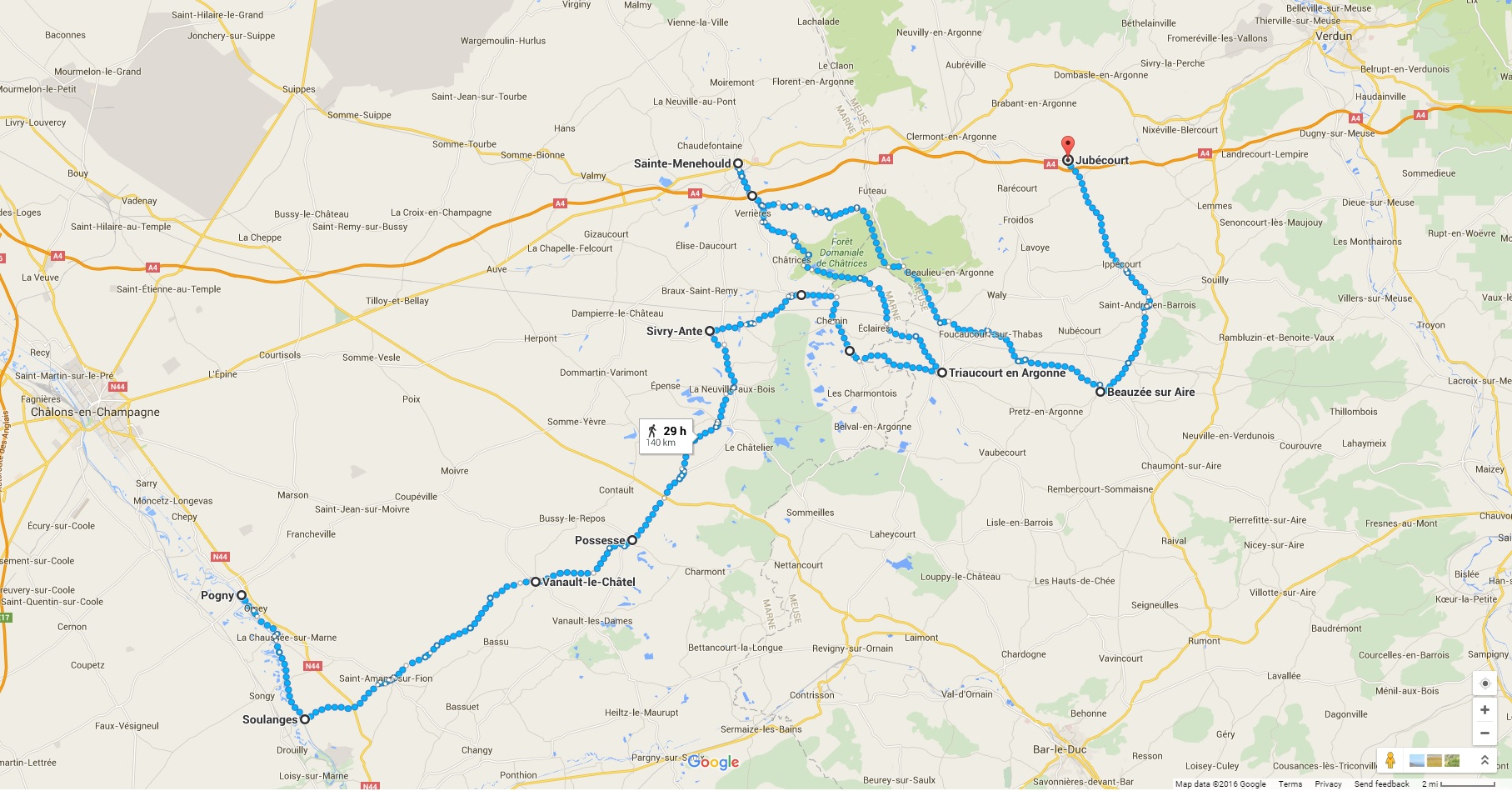
Map showing the location of the 151 RI billets and approximate march route as the regiment ("stages") to Verdun from 25 February to 8 March 1916.
On 27 February, the regiment resumes specialist training in the morning, while the afternoon is spent in battalion exercises. The anticipation in the ranks was palpable. Sous-Lieut. Roger Campana wrote:
We're marching to Verdun! We were alerted in the night of the 24th-25th and in the morning of the 25th, we departed the pretty village of Pogny with the regimental band out front. We're off to fight again, and the fighting will be particularly hot this time...[Yet] the thought of fighting to save our old garrison town is welcomed with an animated joy. The regiment has a superb allure. The morale of the men is excellent.When the great French novelist, Jules Romains, wrote his volume "Verdun" (part of the multi-volume series "Men of Good Will"), he largely based his fictional telling of the battle on Sous-Lieut. Campana's account. Romains wrote in his book:
From the moment the march started, the men were conscious of a feeling similar to that which they had experienced on leaving Pogny, and again when they had set out from Possesse, but this time raised to higher power: the feeling that they were being drawn into the orbit of a whirlpool.Adj.-Chef Courty is promoted to sous-lieutenant and assigned to 2 MG Co. On 1 March, Chef de Musique Hardit and Commandant Le Monig are evacuated due to illness. Capt. Le Boulanger takes command of the battalion [1 Bat.], while Lieut. Liethoudt takes command of 5 Co. The following day, Médecin-Major Hucliez and Sous-Lieut. Blondelet, coming from the 91 RI, are assigned to 5 and 8 Cos., respectively.Over there, beyond the rolling landscape, brown, light green, dark green, dotted with great patches and stripes of shining white snow; beyond the billowing grasslands and winter woods, twenty or twenty-five miles off, lay a great flaming object, still invisible, but roaring away in the distance, a furnace set in the hollow of the hills and sucking into its blazing heart everything within range. They felt themselves being dragged to the center of the attraction, shoveled into the vast and hungry maw. The thoughts that went on in the secret heart of any single man had very little importance when set against the cosmic activity in which he was called upon to play his part.
At 0600 hrs on 3 March, the regiment leaves its billets at Possesse and Saint-Jean-devant-Possesse, with the regimental colors being taken by 2 Co. The entire regiment billets for the evening at Sivry-sur-Ante [Sivry-Ante]. The next day, the regiment departs at 0530 hrs heading for Sainte-Menehould. Passing through Villers-en-Argonne, it makes a grand halt at Triaucourt before continuing on to its billets in the Valmy Quarter, which had acted as the regiment's cantonment during the its service in the Argonne Forest the year before. As the regiment passes through the Meuse villages, with the band and regimental colors at the head, the men marching in cadence with bayonets fixed, they are greeted by the applause and cheers of the townspeople, who stand out in front of their ruined homes. The warm receptions helped to bolster the strength of the men during the exhausting forced march, made more difficult by rain showers and the muddy, rutted roads. Campana notes that since 26 February, the regiment had already covered 90 km. The regiment will get a brief respite from its exertions as it rests at Valmy Quarter for another day. Lieut. Antier, coming from the 91 RI depot, takes command of 6 Co.
At 0700 hrs on 6 March the regiment departs Valmy Quarter and takes a southeastern march to its new billets. The regimental colors are taken by 5 Co. It's another long, trying march over slippery mud roads. Despite this, the 151 marches 40 km on 6 March, a new record for the regiment. The march lasts well into the night, the final leg aided by the light of the rising moon. The 1 and 3 Bats., CHR and staff, and 1 MG Co arrive at their new cantonment, Bauzée-sur-Aire, at 2100 hrs. The 2 Bat., 2 and 3 MG Cos., and Engineers Co. 6/3 ter. billet at Èvres. The villages had been ravaged during the fighting in 1914 and made a great impression on Campana.
Sections of wall stood on both sides of the road and we felt like we were marching into a necropolis. Only the sound of our steps broke the silence. From this desolation a strange charm emanated, undefinable and mysterious.We were able to find some barns in which we passed the night but we were very cold. [The next] morning, it snowed heavily. I visited the village. It’s as dismal during the day as it is beautiful at night. We only find stones, beams blackened by fire, rusty and twisted iron rods, shapeless debris, parts of tables, wardrobes or beds. The church is in a lamentable state, only its clock is still intact. All the stained glass is broken, the altar is demolished, the sculptures no longer remain save the Christ, miraculously spared and gazing with sorry eyes on this sad spectacle: "Love one another," it had said.
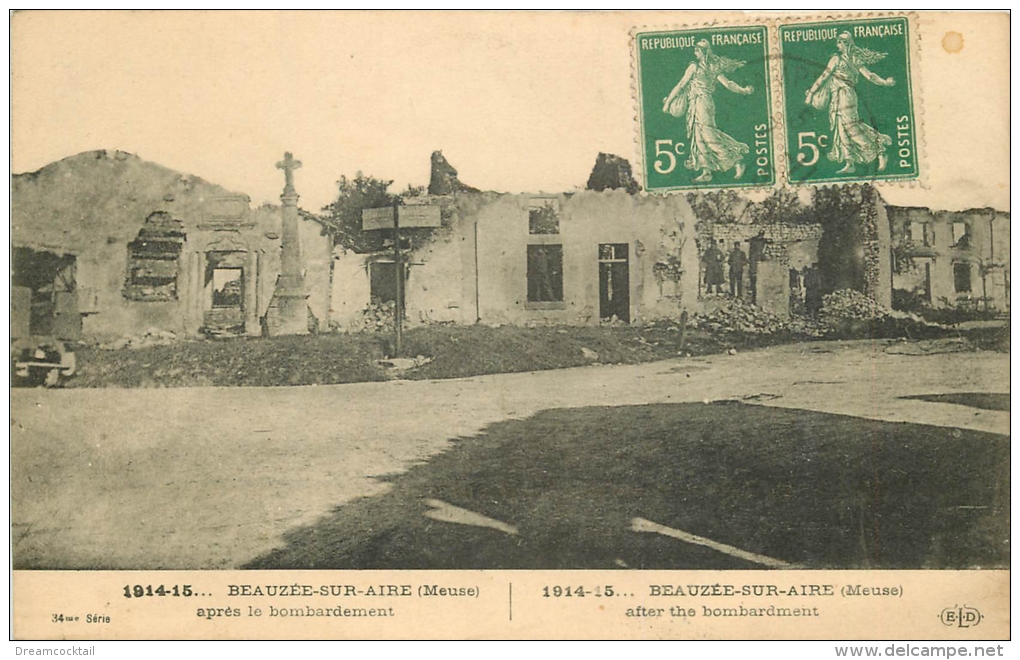
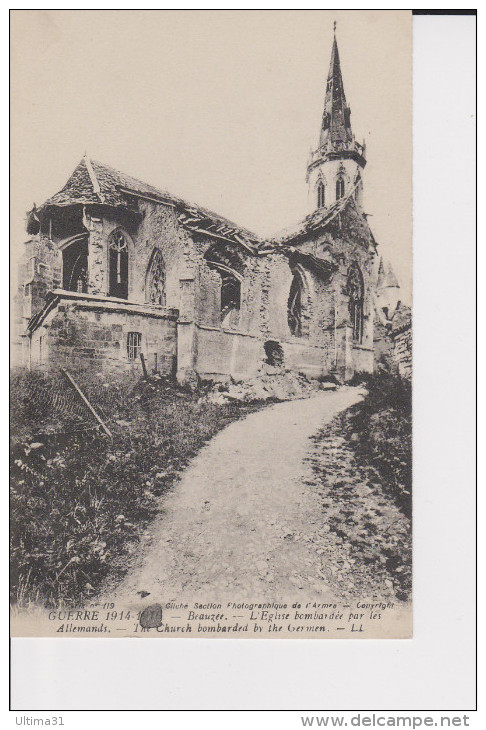
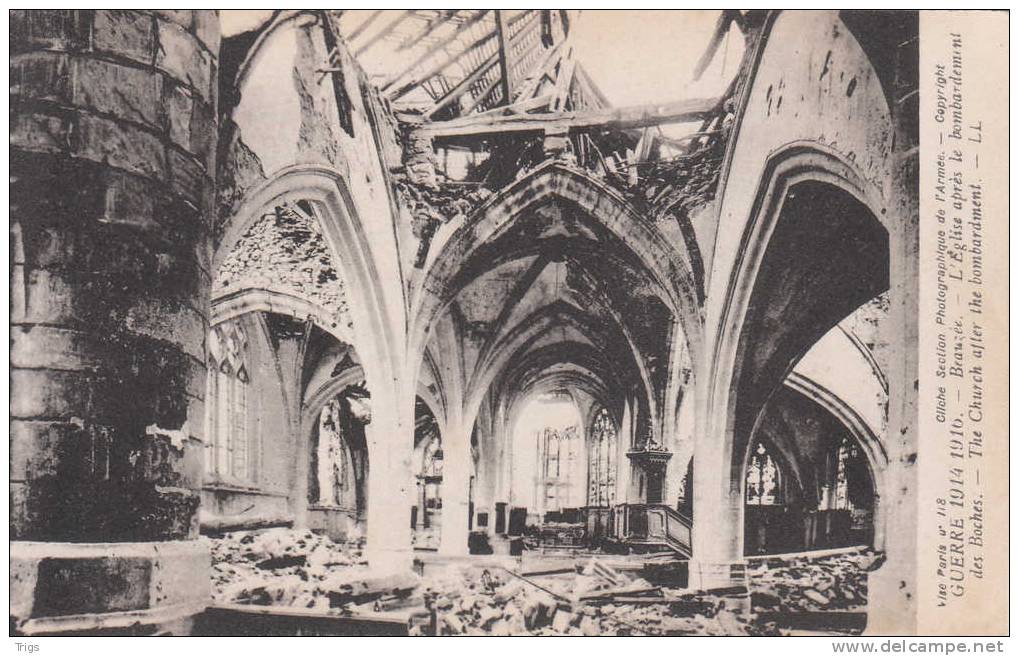
The ruins of Bauzée-sur-Aire.
After a day’s rest, the regiment leaves Bauzée and Èvres on 8 March at 0700 hrs to continue its march to Verdun through a blinding snow storm, the gusting wind biting at the faces of the men. The 1 and 2 Bats., CHR and staff billet at Jubécourt. The 3 Bat., 1 MG Co., and Engineers Co. 6/3 ter. billet at Ville-sur-Cousances, while 2 and 3 MG Cos. stay at the Arnancourt Farm (just south of the entrance of Ville-sur-Cousances).
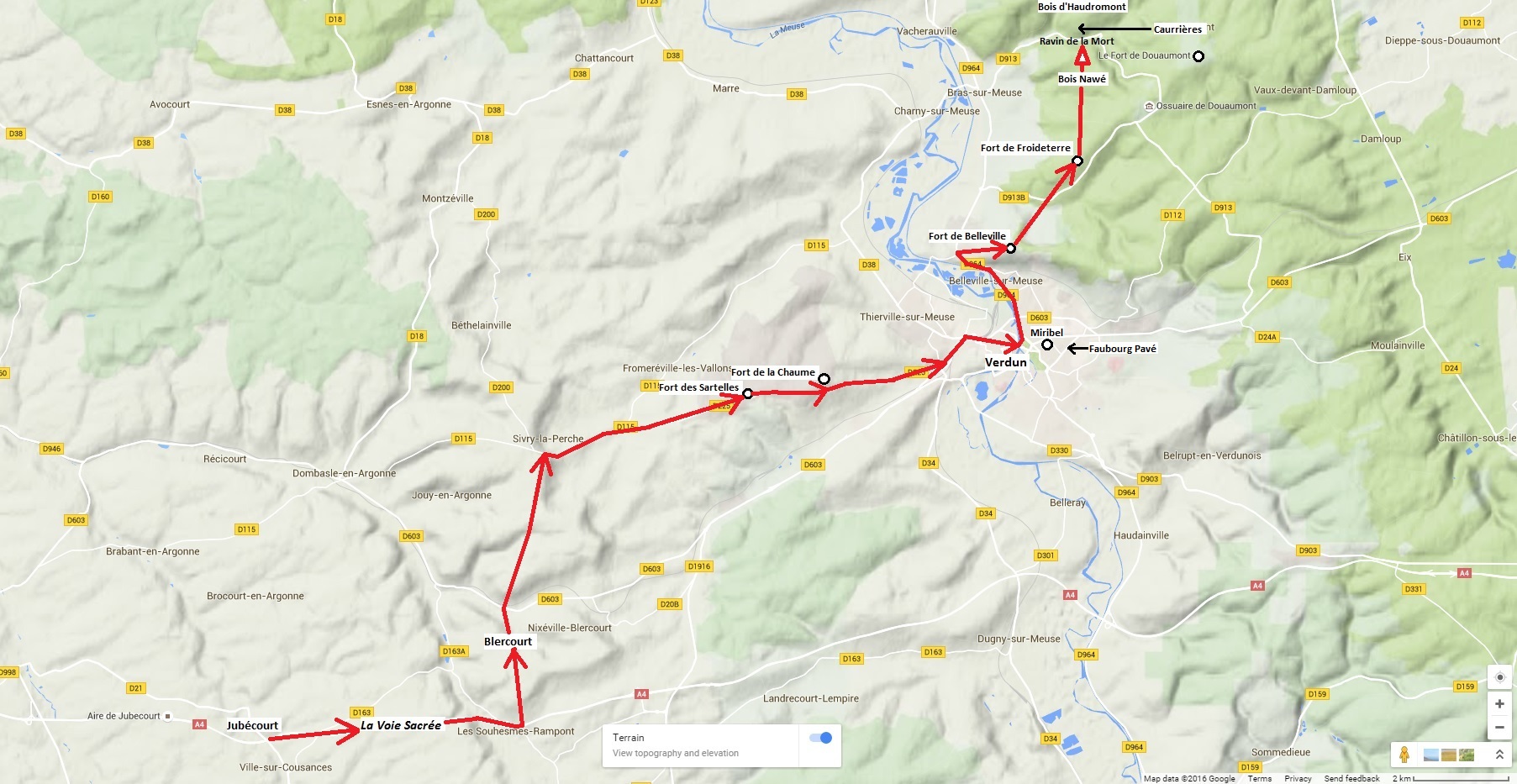
Map showing the 151 RI final approach to Verdun and the approximate march route, 9-10 March 1916.
9 March: In the night of 8-9 March, the regiment receives orders to leave its billets and move to Verdun. Lieut.-Colonel Moisson with other senior officers and MG company commanders, heads off in advance of the regiment to reconnoiter its new sector. In Moisson’s absence, Cmdt. Tisseraud (3 Bat. commander) takes over. The regiment departs Jubécourt and Ville-sur-Cousances at 0500 hrs and marches along the main Paris - Verdun Road (the modern A4). As the column got nearer to Verdun, the roads became increasingly crowded with convoys of trucks filled with munitions and supplies being sent up the great devouring beast of battle.
As they marched, the column would be suddenly overtaken by a line of trucks. Calls of "To your right...to your right.." would rise up, the warning passing up from tail to head of the column. The men would grumble as they slowly elbowed their right-hand neighbors off the road. Alternately, the head of the column would quietly make room for a throng of refugees passing from the opposite direction. The two bodies of people moving in opposite directions passed each other in silence. Those men from the occupied districts of northern France found this to be particularly painful, as they envisioned the sufferings of their families, whom they were cut-off from behind enemy lines. Campana recorded:
The road was crowded with trucks, wagons loaded with furniture, women, old folks, children. Dombasle and the neighboring villages had been evacuated. The painful faces of these poor people who fled their once happy homes was painful to see. They looked upon us with pity as we passed. The crowding of vehicles became so bad that we had to abandon the Paris – Verdun Road and take the path to Fort des Sartelles. Night was falling. On the distant heights we could see big shells exploding.As the regiment got nearer to Verdun, the general congestion increased. The crowding of vehicles eventually forced the regiment to abandon the Paris – Verdun Road at the junction with Rampont. There the column turned left onto a road that led to Blercourt. From there, the column took a narrow country lane up to Fort des Sartelles. After passing Sartelles, the march continued along the heights passing Fort de la Chaume.
Night was falling as they passed Blercourt. On the distant heights they could now see heavy caliber shells exploding, accompanied by a deep rumbling of countless cannon discharges and shell bursts. After cresting the top of the ridge and passing Sartelles, the regiment continued its march along the heights, next passing Fort Chaume on the left.
Once we reached Fort de la Chaume, our fatigue got worse, which was the fault of the company commander at the head of the column. The terrain was very undulating, the men of the first company quickly descended the slopes without concerning themselves with those behind them. The other company commanders, not wishing to lose contact, quickened the pace. The movement spread by degrees and amplified itself, such that the unfortunate men of 12th Company often had to march at the double-time then come to sudden stops because the gentlemen in the first company climbed a slope just as slowly as they had quickly descended the preceding one. This accordion movement goes on for more than an hour and you can easily imagine the torture that the unfortunate men of the companies in line had to endure, obliged to run, stop suddenly, run again, and all while carrying a full load.For Campana this torment was only further exacerbated as he was once again suffering from an acute attack of intestinal pain. Despite the burning feeling he felt in his belly, his fear of missing out on the big battle to come outweighed his discomfort and Campana maintained his place with his company.
At 8 pm we reached the final crest. AA fantastic vision presents itself to our eyes. There extended along the horizon a blood-red band of light, the brightness of which gradually faded to become a violet hue as it spread outward, eventually melding with the color of the larger night sky. In the distance small purple lights flickered, went out, suddenly brightened again. There were easily a hundred of them: they were German shells being illuminated by fires below, the homes of Verdun burning in the night.Corporal Henri Laporte, in 8 Company, had been suffering through the long marches to Verdun as well. He recorded in his diary:
After three days and three nights of forced marches through rain and snow, and stopping only to eat, we arrive [at Verdun]. The ground was frozen and slippery, the snow was still falling. The town is being bombarded. Shells were bursting and fires burned all around. Our last stage had been tough: we've marched without stop for twenty-four hours.The regiment finally arrived at Verdun between 2200 and 2300 hrs. The town appeared deserted, the streets were filled with wood beams, tiles, shards of glass. The telephone wires that hung from the houses and snaked across the ground tripped the men up as they shuffled along on their weary legs. Beds, cabinets, armchairs lay pell-mell among the rubble where twisted iron bars jutted out here and there. From the breaches in facades and smashed window frames, the sky appears to become redder in color as the burning fires created a shifting, evil light. Laporte described the lodgings his company was given:
…[M]y company billets in a group of abandoned houses. We were lodged (the men of my half-section and myself) on the third floor, in a room with a ceiling that was gaping wide open, punctured in the center by a falling shell. A moment later, some poilus from the section brought us some food stuffs (forgotten, certainly intentionally, by the inhabitants). We listen to the sound of a distant cannonade and the shell explosions in the neighborhood, which now and then caused our little pigeon house to shake. We were tired from the long march and tremendous effort exerted. We soon fall asleep, undisturbed by the falling shells.In fact, the billets Laporte and his comrades are lodged in were on Rue Saint-Saveur: one battalion was billeted at the Hôtel de Ville, another at the Sainte-Catherine Hospital, and the last at the Congregation [Sainte-Catherine Church]. It came to light that at some point, the pharmacy at the hospital had been raided and medicinal supplies taken. An abandoned café had also been pilfered and bottles of liquor had been stolen. The raiders were never caught by the authorities and a very fortunate thing that was, for just a day or two before, three soldiers had been caught taking jewelry from an abandoned jewelry store and were subsequently executed against the wall of the Faubourg Pavé cemetery.
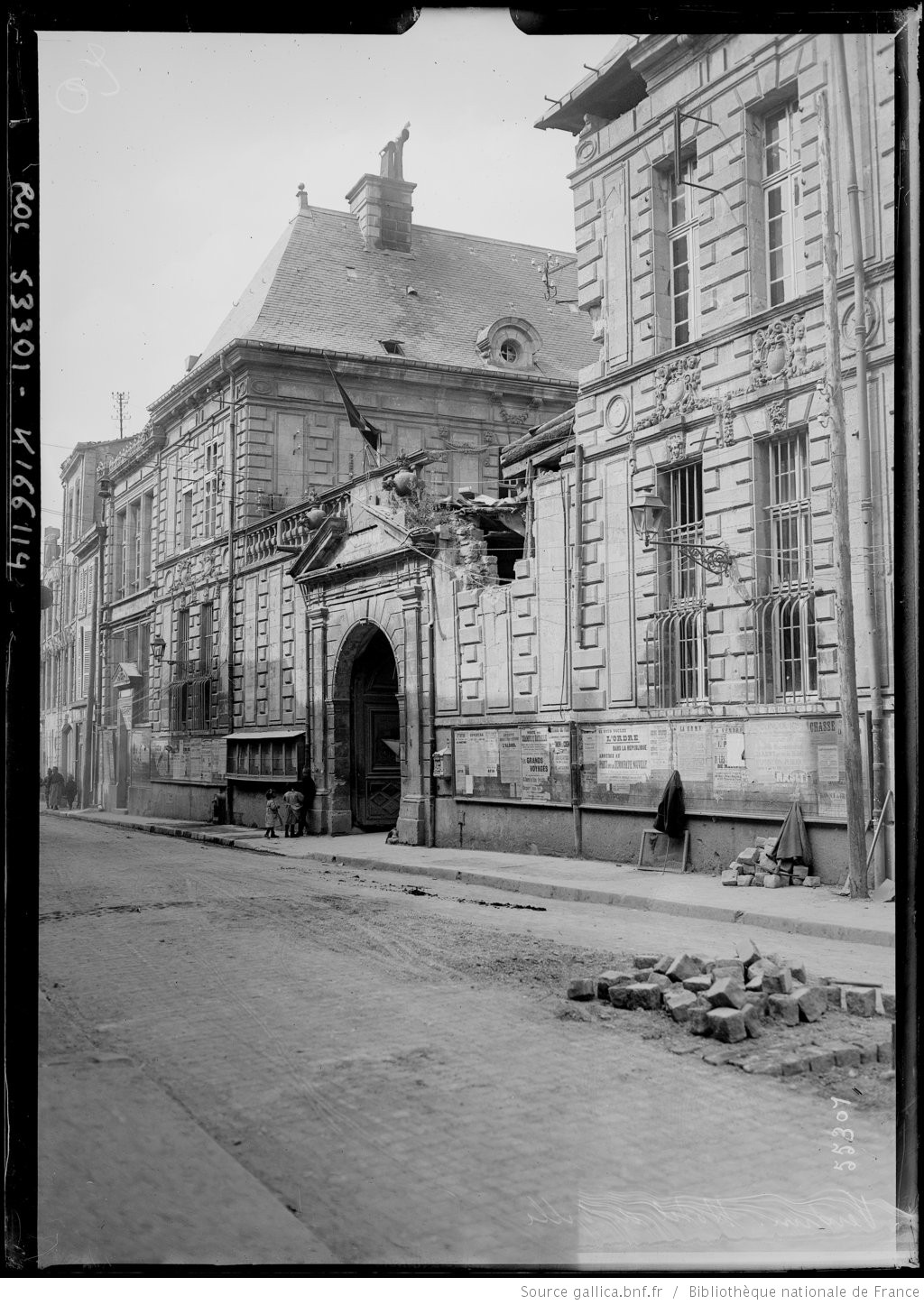

On the left, the Verdun Hôtel de Ville in 1916; on the right, the Congregation and Hospital of Saint-Catherine in Rue Saint-Saveur, Verdun. The men of the 151 got a couple hours of sleep on 9 March at these locations before being sent up to the front lines.
The next day the 42 DI is to relieve the severely battered 39 DI. The officers meanwhile would have to wait a little longer before getting some rest. Late that night, General Deville (commanding 42 DI) summons all the officers from the units of the two brigades under his command to the Verdun Hôtel de Ville. There, he holds a short briefing to address the role the division is to play in this dire period. Ill-tempered, Deville addresses the exhausted audience in stark terms:
"Gentlemen, Verdun is threatened. You are at Verdun and you are the Verdun Brigade. I won't hide the truth from you; we've been taken by surprise...I won't hide the mistakes from you; we must fix them... The situation was desperate; it’s not yet stabilized. The sector that we're taking up? Chaos... The life which awaits us there? Battle... The trenches? They don't exist... Don't ask me for material: I don't have any... Reinforcements: I don’t have any to provide..."With that, the general abruptly departed, leaving his audience in a chilled silence.Three times his voice breaks, becoming hoarse at the end. A cold sinks into our bones, chilling the heart. Behind his words, death hovers silently.
"Bon courage, messieurs!"





